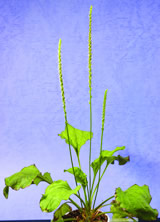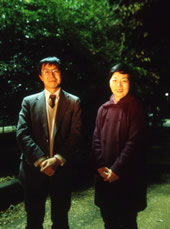| Biohistory journal, Spring, 2006: Index > The abundant creation of forms understood from a general sense of strangeness |
| An examination from the leaves The abundant creation of forms understood from a general sense of strangeness | |
| |
Dr.Tsukaya Japan is a treasure house of wild grasses. The relationship between these wild grasses and human beings is quite interesting. Weeding has been assiduously performed at old and venerable temples and shrines, so the plantains have become smaller. This already has been recorded in the Honzo Zufu. Dr.Nakamura: If the plantains at the Itsukushima Shrine and the Mii Temple were smaller during the Edo period, they changed rather rapidly. But we’ll preserve them, because their form is their essence. Dr.Tsukaya: When the plantains get smaller, there will be no change in the cell form and size, but the number of cells is reduced. I want to see the essence of form creation to determine why the small cells enable creation in their original form. When I look carefully, I unexpectedly feel a general sense of strangeness. That leads to discovery. Dr.Nakamura: The sense that something is strange arises from the accumulation of the time one has spent looking at various things. When one observes well, a sixth sense - not logic - enabling understanding begins to function. That is connected to direct observation. |
After the Dialogue / Hirokazu Tsukaya Imagining Mr. Tsukaya as a high school student, I am thankful that he has become such a wonderful researcher whose opinions I really want to hear. (Keiko Nakamura) |
| Dialogue |
|
Please close a window with the button of a browser who are turning off Javascript. |


